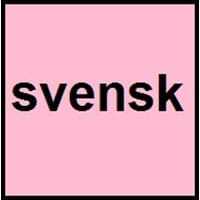Swedish and Filipino
Countries
European Union, Finland, Nordic Council, Sweden
Philippines
National Language
Sweden
Philippines
Second Language
Finland
Philippines
Speaking Continents
Antartica, Europe
Asia
Minority Language
Australia, Belgium, Canada, France, Germany, Netherlands, Spain, Switzerland, United Kingdom, United States of America
Not spoken in any of the countries
Regulated By
Institute for the Languages of Finland, Swedish Academy, Swedish Language Council
Komisyon sa Wikang Filipino
Interesting Facts
- In Swedish language, article comes after noun.
- Most of the words in Swedish language began "S" than any other letter.
- "Filipino" was officially declared as national language by the constitution in 1987.
- "Filipino" is the official name of Tagalog, or synonym of it.
Similar To
Norwegian and Danish Language
Tagalog Language
Derived From
Old Norse Language
Spanish Language
Alphabets in
Swedish-Aphabets.jpg#200
Filipino-Alphabets.jpg#200
Writing Direction
Left-To-Right, Horizontal
Not Available
Thank You
tacka dig
Salamat
How Are You?
hur mår du
Kumusta
Good Night
godnatt
magandang gabi
Good Evening
god kväll
Magandang gabi
Good Afternoon
god eftermiddag
Magandang hapon
Good Morning
god morgon
Magandang umaga
Please
vänligen
Mangyaring
Sorry
ledsen
pinagsisisihan
I Love You
jag älskar dig
Mahal kita
Excuse Me
ursäkta mig
patawarin ninyo ako
Where They Speak
Gabon
Philippines
How Many People Speak
Not Available
Dialect 2
Dialects
Hiligaynon
Where They Speak
Georgia
Philippines
Where They Speak
France
Philippines
Speaking Population
Not Available
Native Name
Svenska
filipino
Alternative Names
Ruotsi, Svenska
Pilipino
French Name
suédois
filipino; pilipino
German Name
Schwedisch
Pilipino
Pronunciation
[ˈsvɛ̂nskâ]
[ˌfɪl.ɪˈpiː.no]
Ethnicity
Swedes, Finland Swedes
Not Available
Origin
13th Century
16th Century
Language Family
Indo-European Family
Austronesian Family
Subgroup
Germanic
Not Available
Branch
Northern (Scandinavian)
Not Available
Early Forms
Old Swedish
No early forms
Standard Forms
Standard Swedish
Filipino
Language Position
Not Available
Signed Forms
Tecknad svenska, ("Signed Swedish")
Not Available
Scope
Individual
Individual
ISO 639 1
sv
No Data Available
ISO 639 6
Not Available
Not Available
Glottocode
swed1254
fili1244
Linguasphere
52-AAA-ck to -cw
No Data Available
Language Type
Living
Living
Language Linguistic Typology
Subject-Verb-Object
Not Available
Language Morphological Typology
Not Available
Not Available
All Swedish and Filipino Dialects
Most languages have dialects where each dialect differ from other dialect with respect to grammar and vocabulary. Here you will get to know all Swedish and Filipino dialects. Various dialects of Swedish and Filipino language differ in their pronunciations and words. Dialects of Swedish are spoken in different Swedish Speaking Countries whereas Filipino Dialects are spoken in different Filipino speaking countries. Also the number of people speaking Swedish vs Filipino Dialects varies from few thousands to many millions. Some of the Swedish dialects include: Dialects, Dialects. Filipino dialects include: Bikol , Hiligaynon. Also learn about dialects in South American Languages and North American Languages.
Swedish and Filipino Speaking population
Swedish and Filipino speaking population is one of the factors based on which Swedish and Filipino languages can be compared. The total count of Swedish and Filipino Speaking population in percentage is also given. The percentage of people speaking Swedish language is 0.13 % whereas the percentage of people speaking Filipino language is Not Available. When we compare the speaking population of any two languages we get to know which of two languages is more popular. Find more details about how many people speak Swedish and Filipino on Swedish vs Filipino where you will get native speakers, speaking population in percentage and native names.
Swedish and Filipino Language Codes
Swedish and Filipino language codes are used in those applications where using language names are tedious. Swedish and Filipino Language Codes include all the international language codes, glottocodes and linguasphere.





